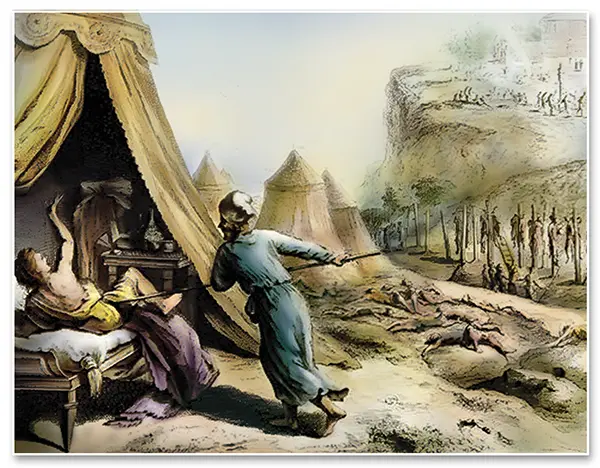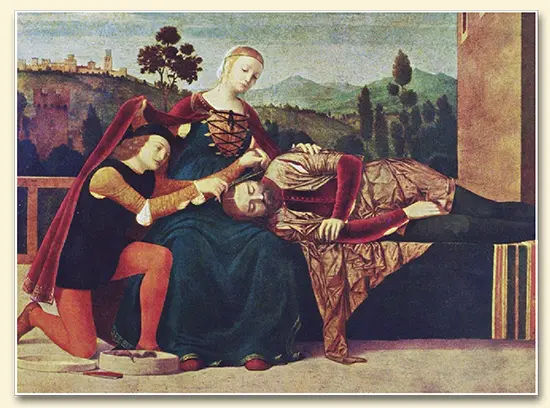There was among the people of Israel a fiery young man, in whose gaze Moses surely discerned a sublime calling. His name was Phinehas.
This man’s crystalline fidelity, the work of a lifetime, shone in a unique way in a little-known episode in the history of the chosen people, which nevertheless earned him a place of honour among the illustrious men praised by Sirach: there he is listed as “the third in glory” (45:23a), counted among those who received the priestly dignity from the Lord.
Among the wicked, a handful of faithful
The Scriptures recount that, since the Israelites’ departure from Rameses on the day after Passover (cf. Nm 33:3), God had continually shown his favour toward them, despite their being an unbelieving and rebellious people. Indeed, the sacred text reveals that a wicked and insurgent faction was machinating virulently in their midst.
On the other hand, there were also among the people some faithful souls, zealous for the Law of the Lord and naturally closer to Moses, who played an important role in his victories over the prevailing iniquity. Among these was the one who “was zealous in the fear of the Lord” (Sir 45:23b).
Moab causes Israel to stumble
In the final moments of their glorious exodus from the land of Egypt, characterized by extraordinary phenomena in which faith and miracles walked side by side, the Israelites reached the steppes of Moab, at the gates of the Promised Land, to camp there. However, a brief period of rest was followed by a grave transgression. It was the last hour before the fulfilment of the promises, the final examination to be passed before receiving the long-awaited recompense.
Not long before, an enigmatic non-Jewish soothsayer named Balaam had passed by. He had been incited by the king of Moab to curse Israel, but the Lord miraculously prevented him and revealed to him His predilection for the Chosen People (cf. Nm 22–23). This time, Balaam dared to give that sovereign evil advice, through which he would be able to triumph over Israel: that he should infiltrate Midianite women among the Hebrews, who would seduce them to the sin of the flesh and then lead them to idolatry with their gods (cf. Nm 31:15-16).
Many indeed allowed themselves to be drawn into this infamy, forgetting the One who had saved them from the Pharaoh. These Midianite women then demanded that they consecrate themselves to Baal of Peor, and blinded by passion, they obliged.1
Now, the Lord was watching over His own, and in the face of such sin, He was filled with wrath. With ardent desire for Israel to return to the right path, and considering them a stiff-necked people (cf. Dt 31:27), He saw fit to punish them with a terrible plague.
A lesson in intransigence
While many were dying from the plague, Moses gathered the leaders and judges of the people to convey instructions from the Lord to them. Before the entire assembly, one of the princes of the tribe of Simeon, named Zimri, rose up against Moses, saying, “You will no longer have me follow your tyrannical commands.”2 And his audacity did not end with these words: in the sight of all, he brought into the camp a Midianite woman to whom he was illegitimately united.

“Zimri and Cozbi are slain by Phinehas” – Engraving by David Martin (edited)
Then Phinehas, considered one of the leading youths of the people, both as the son of the high priest Eleazar and nephew of Moses himself, and for his virtue and courage in hardship, resolved to avenge this outrage before Zimri’s infamy drew others to the same revolt. Filled with righteous anger and love for the Law (cf. 1 Mc 2:24-26), “he rose and left the congregation, and took a spear in his hand and went after the man of Israel into the inner room, and pierced both the man of Israel and the woman” (Nm 25:7-8), so that both perished with a single blow.
At that moment, the plague that had been raging among the Israelites ceased. Twenty-four thousand men had perished in the chastisement (cf. Nm 25:9).
“He has turned back my wrath from the people”
Appeased in His divine wrath, the Lord said to Moses: “Phinehas the son of Eleazar, son of Aaron the priest, has turned back my wrath from the people of Israel, in that he was jealous with my jealousy among them, so that I did not consume the people of Israel in my jealousy. Therefore say, ‘Behold, I give to him my covenant of peace; and it shall be to him, and to his descendants after him, the covenant of a perpetual priesthood, because he was jealous for his God, and made atonement for the people of Israel’” (Nm 25:11-13).
Thus shone the moral stature of the man upon whom the Most High had placed the promise made to Aaron and the tribe of Levi: “I am your portion and your inheritance among the people of Israel” (Nm 18:20). And ardent love for God’s Law and steadfastness in the face of wickedness were forever rewarded.
After these events, war broke out against Midian, and Moses sent Phinehas as commander of the Israelite troops (cf. Nm 31:6). “The Lord was with him” (1 Chr 9:20)! Twelve thousand men, a thousand from each tribe of the Chosen People, decimated the cities of Moab. Among the slain were all the Midianite kings and Balaam. A new phase of Israel’s history began: having triumphed over their enemies and made atonement for their sins, they were finally to enter the Promised Land.
While he lived, Israel did not sin.
When, in a magnificent and mysterious way, the Lord called the great Moses to Himself, Phinehas, because of his proven and recognized virtue, became one of Joshua’s closest aides, as evidenced by his having been the messenger of Joshua’s orders to the tribes of Transjordan.
The Reubenites, Gadites, and half the tribe of Manasseh built an altar in their territory beyond the Jordan, intending it as a symbol of union with God and the other tribes. This attitude, however, was misinterpreted by the Israelites, and Joshua sent Phinehas and ten other leaders to inspect what they believed to be a deviation from the worship of the true God (cf. Jos 22:9-29). Enlightened about the reality, Phinehas told them: “Today we know that the Lord is in the midst of us, because you have not committed this treachery against the Lord; now you have saved the people of Israel from the hand of the Lord” (Jos 22:31).
This was Phinehas’ last intervention recorded in Scripture. As long as he and his descendants lived, Israel did not sin (cf. Jgs 2:7).
Integrity, intransigence, and restoration
The story of this man of God – which took place in the context of the Exodus and is perhaps incomprehensible to the present-day mentality – proves the value of integrity in God’s eyes. When Phinehas’ virtue was confronted with evil, and when exhortations to conversion were no longer of any avail, it developed into intransigence and restored the order which had been shattered by sin. For this reason, he merited divine blessing and contentment: “And that has been reckoned to him as righteousness from generation to generation for ever” (Ps 106:31).
May Phinehas, from the heights of Heaven, intercede with God for the Church Militant and obtain for all its members the holiness necessary for iniquity to be eradicated from our hearts, making the earth a place of true peace under the rule of Jesus and Mary. ◊
A Useful Lesson for the Soul
Pleasure is the bait presented by every vice to easily draw sensual souls to the hook of perdition. It is above all through impure pleasure that nature is dragged into evil, without self-control.
That is what happened on this occasion. Indeed, men who had prevailed over the enemy’s weapons, who had shown iron to be weaker than their own strength, and who with their power had put the enemy army to flight, ended up wounded by feminine darts through pleasure. And those who had overcome men became hostages of women. […]
What lesson can we draw from this account? This: that having learned what a great power for evil the disease of pleasure possesses, we ought to conduct our lives as far removed from it as possible, so that this disease – which resembles fire that by its very proximity, ignites the flame of perversity – may find no entry in us.

Samson and Dalilah, by Francesco Morone – Poldi Pezzoli Museum, Milan (Italy)
This is what Solomon teaches in Wisdom when he says that one should not tread on hot coals with bare feet nor hide fire in one’s bosom (cf. Prv 6:27-28), for it is within our power to remain free from passion, as long as we stay away from that which inflames. But if, on the contrary, we come close enough to touch this burning fire, the flame of concupiscence will penetrate our interior, and then the burning of our feet will follow, and destruction in our bosom.
The Lord in the Gospel, with His own voice, so that we might stay far from this evil, cuts out the very root of passion – namely, the concupiscence that arises through sight – when He teaches that whoever permits passion to enter through the eyes opens the door to disease, against themselves (cf. Mt 5:28). Perverse passions, like a plague, once they have dominated the critical points, cease only with death. ◊
ST. GREGORY OF NYSSA.
The Life of Moses, c.XXVII, n.297-298; 303-304
Notes
1 Cf. FLAVIUS JOSEPHUS. Jewish Antiquities. L.IV, c.6, n.7-9.
2 Idem, n.11.


